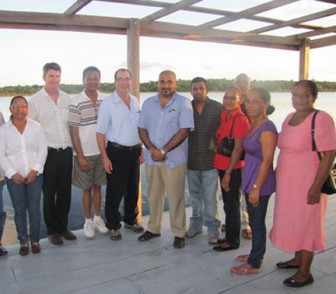Minister of Amerindian Affairs Pauline Sukhai met with officials from the IAST and Trent University of Canada at Mainstay, Region Two to discuss possible areas of collaboration, in keeping with a Letter of Intent agreement recently signed by the two entities.
The comprising Director of the Institute of Applied Science and Technology (IAST) Dr Suresh Narine who also collaborates with the Trent Centre for Biomaterials Research; President and Vice Chancellor of Trent University Dr Steven E. Franklin, and the University’s Vice President, Research & International Dr. Neil Emery met with the Community’s Toshao Yvonne Pearson and village councillors.

According to a Government Information Agency (GINA) press release the Letter of Intent will allow the two institutions to collaborate in areas such as indigenous, sustainability and environmental studies, climate change, water management, green chemistry and biomaterials. Sukhai said she is pleased that Trent is interested in pursuing a relationship with Guyana, particularly in the indigenous people. She said Guyana’s indigenous people have a rich history and while there is visible evidence of development in those areas, “that traditional aspect that defines the indigenous culture has remained.” She noted that government has fashioned development in these areas to mesh with maintaining each village’s uniqueness.
“In the face of development, Government has ensured that the indigenous people secure an identity among the country’s multi-ethnic society,” Sukhai said, adding that much has been accomplished during the Amerindian Heritage Month activities established by the government. “Heritage month has seen trends whereby the indigenous people themselves are trying to sustain their culture…although there has been obvious change, what is noticeable, is the renewal of the interest of the Indigenous people themselves to understanding their history and the background from whence they came,” she noted. The minister also told the Trent team that besides Mainstay/Whyaka, there are many other indigenous communities where opportunities might be available for collaboration between the two entities.
According to GINA, government has been taking steps put in place a dictionary for the nine languages of the indigenous people of Guyana and many of the Amerindian communities and organisations have been adding to this effort. She singled out the Wapishana Organisation which is working on putting the Wapishana and Macushi languages into writing, noting that this is an area where the Trent team may be able to give support.
In his address, Dr Narine said that the initiative to build a relationship between Trent University and Guyana stems from the fact that the former has a very strong focus on indigenous studies. Trent University hosts one of the oldest PhD indigenous people’s programme in North America with studies focusing on areas such as indigenous knowledge, culture, languages, politics, history and cultural expressions. The university also has a very large indigenous reserve just off its university campus called the Cape Croker Indian reserve.
Dr Narine noted too that the university holds firm to the belief that indigenous studies provide the opportunity not just for exploring the culture of the first people but, also learning with regards to development. Learning from the first people is very important to Guyana’s development, he added, and because of Trent’s long history in this area, the university feels it might have a role to play in this regard.
In addition, Guyana will also be providing an opportunity for Trent to learn about indigenous relations. “Guyana has one of the most progressive first people’s land right programme, where the Amerindians own their own land and Government must negotiate with them concerning developmental issues pertaining to these land,” he explained. This can help to advance similar steps being undertaken in North America and Mexico, where there have been several years of strife surrounding indigenous land right.
Meanwhile, Dr Franklin said that Trent expects that its understanding of the indigenous culture can only be deepened and its understanding of indigenous culture expanded, through a relationship with Guyana. He also said that indigenous knowledge and studies provide an alternative way of understanding the earth and the university would be happy to come to Guyana to work and promote this type of understanding and vision here.




